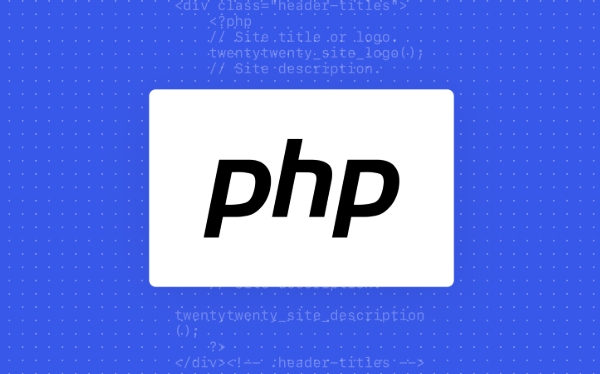 Backend Development
Backend Development
 PHP Tutorial
PHP Tutorial
 Architecting with Immutability: Strategic Use of Constants in PHP
Architecting with Immutability: Strategic Use of Constants in PHP
Architecting with Immutability: Strategic Use of Constants in PHP
Jul 29, 2025 am 04:52 AMConstants should be used to enforce immutability in PHP for better code clarity and safety; 1) use constants for configuration and domain logic like status codes or API endpoints to avoid magic values; 2) prefer class or interface-scoped constants over global ones to improve namespacing and discoverability; 3) adopt PHP 8.1 backed enums for fixed value sets to gain type safety and validation; 4) follow best practices by grouping related constants, using uppercase naming, and avoiding dynamic values; 5) integrate constants with configuration loaders and dependency injection to centralize settings and reduce hardcoding; this approach ensures code is maintainable, predictable, and scalable.

When building robust PHP applications, one of the most underrated yet powerful practices is embracing immutability—especially through the strategic use of constants. While PHP is inherently a mutable language, thoughtful use of constants can bring clarity, safety, and architectural consistency to your codebase.

Why Immutability Matters in PHP
Immutability means that once a value is set, it cannot be changed. In PHP, this concept isn’t enforced globally like in functional languages, but you can simulate it using constants, immutable objects, and disciplined coding patterns.
Constants are the simplest form of immutability. They prevent accidental reassignment and make your intentions explicit. When used well, they reduce bugs, improve readability, and support predictable behavior—especially in larger systems or team environments.

Use Constants for Configuration and Domain Logic
Instead of scattering magic values (strings, numbers, etc.) throughout your code, define them once as constants. This applies especially to:
- Application configuration (e.g., retry limits, timeouts)
- Domain-specific values (e.g., user roles, status codes)
- External dependencies (e.g., API endpoints, keys if safe)
class UserStatus
{
public const ACTIVE = 'active';
public const INACTIVE = 'inactive';
public const PENDING = 'pending';
}
class ApiConfig
{
public const BASE_URL = 'https://api.example.com/v1';
public const TIMEOUT_SECONDS = 30;
}By centralizing these values, you eliminate the risk of typos and make future changes easier. For example, renaming a status becomes a single-point update.

Class Constants vs. Global Constants: Scope Matters
Avoid defining constants at the global scope. Instead, group them logically within classes or interfaces. This improves namespacing and discoverability.
interface PaymentMethod
{
public const CREDIT_CARD = 'credit_card';
public const PAYPAL = 'paypal';
public const BANK_TRANSFER = 'bank_transfer';
}Now, anyone working with payment logic can type-hint or reference PaymentMethod::CREDIT_CARD—making the code self-documenting and IDE-friendly.
Combine Constants with Enumerations (PHP 8.1 )
If you're using PHP 8.1 or later, backed enums are often a better choice than constants for fixed sets of values.
enum UserRole: string
{
case Admin = 'admin';
case Editor = 'editor';
case Viewer = 'viewer';
}Enums provide type safety, iteration, and validation out of the box. You can still use constants for scalar values that don’t represent a discrete set.
But if you're on an older PHP version, class constants with strict comparisons are the next best thing.
Best Practices for Architecting with Constants
- ? Group related constants in classes or interfaces
- ? Use
publicvisibility unless you have a reason to restrict - ? Name them in uppercase by convention (
CONSTANT_NAME) - ? Avoid duplicate values across different constant groups
- ? Don’t use constants for dynamic values (e.g., timestamps, user input)
- ? Don’t overuse global constants—they pollute the namespace
Also, consider using constants in combination with configuration loaders:
class AppConfig
{
public const ENV = 'production';
public const LOG_LEVEL = 'error';
}Then inject or reference these where needed, rather than hardcoding values in multiple places.
Final Thoughts
Constants are more than just placeholders—they’re a tool for architectural clarity. By treating them as part of your domain model and leveraging immutability where possible, you create code that’s easier to test, maintain, and scale.
In modern PHP, constants work best alongside enums, type hints, and dependency injection. Used strategically, they help you build systems that are not just functional, but intentional.
Basically: define once, use everywhere, never change—immutability done right.
The above is the detailed content of Architecting with Immutability: Strategic Use of Constants in PHP. For more information, please follow other related articles on the PHP Chinese website!

Hot AI Tools

Undress AI Tool
Undress images for free

Undresser.AI Undress
AI-powered app for creating realistic nude photos

AI Clothes Remover
Online AI tool for removing clothes from photos.

Clothoff.io
AI clothes remover

Video Face Swap
Swap faces in any video effortlessly with our completely free AI face swap tool!

Hot Article

Hot Tools

Notepad++7.3.1
Easy-to-use and free code editor

SublimeText3 Chinese version
Chinese version, very easy to use

Zend Studio 13.0.1
Powerful PHP integrated development environment

Dreamweaver CS6
Visual web development tools

SublimeText3 Mac version
God-level code editing software (SublimeText3)

Hot Topics
 Understanding Constant Expression Evaluation in PHP's Engine
Jul 29, 2025 am 05:02 AM
Understanding Constant Expression Evaluation in PHP's Engine
Jul 29, 2025 am 05:02 AM
PHPevaluatesconstantexpressionsatcompiletimetoimproveperformanceandenableearlyerrordetection.1.Constantexpressionevaluationmeanscomputingvaluesduringcompilationwhenalloperandsareknownconstantslikeliterals,classconstants,orpredefinedconstants.2.PHP’se
 Namespacing and Constants: Avoiding Collisions in Large-Scale Projects
Jul 30, 2025 am 05:35 AM
Namespacing and Constants: Avoiding Collisions in Large-Scale Projects
Jul 30, 2025 am 05:35 AM
Namespacingpreventsconstantcollisionsinlarge-scalesoftwareprojectsbygroupingrelatedconstantswithinuniquescopes.1)Constants,whichshouldremainunchangedduringruntime,cancausenamingconflictswhendefinedglobally,asdifferentmodulesorlibrariesmayusethesamena
 The Performance Paradigm: Analyzing the Speed of Constants vs. Variables
Jul 30, 2025 am 05:41 AM
The Performance Paradigm: Analyzing the Speed of Constants vs. Variables
Jul 30, 2025 am 05:41 AM
?Yes,constantsarefasterthanvariablesincompiledlanguagesduetocompile-timeevaluationandinlining.1.Constantsareevaluatedatcompiletime,enablingvalueinlining,constantfolding,andeliminationofmemoryallocation,whilevariablesrequireruntimeresolutionandmemorya
 Unveiling the Behavior of Constants within PHP Traits and Inheritance
Jul 29, 2025 am 03:58 AM
Unveiling the Behavior of Constants within PHP Traits and Inheritance
Jul 29, 2025 am 03:58 AM
PHPdoesnotallowconstantredeclarationbetweentraitsandclasses,resultinginafatalerrorwhenduplicateconstantnamesoccuracrosstraits,parentclasses,orchildclasses;1)constantsintraitsarecopieddirectlyintotheusingclassatcompiletime;2)ifaclassdefinesaconstantwi
 Demystifying PHP's Magic Constants for Context-Aware Applications
Jul 30, 2025 am 05:42 AM
Demystifying PHP's Magic Constants for Context-Aware Applications
Jul 30, 2025 am 05:42 AM
The seven magic constants of PHP are __LINE__, __FILE__, __DIR__, __FUNCTION__, __CLASS__, __TRAIT__, __METHOD__, and they can dynamically return code location and context information, 1. LINE returns the current line number, for precise debugging; 2. FILE returns the absolute path of the current file, often used to reliably introduce files or define root directory; 3. DIR returns the directory where the current file is located, which is clearer and more efficient than dirname (__FILE__); 4. FUNCTION returns the current function name, suitable for function-level log tracking; 5. CLASS returns the current class name (including namespace), in logs and factories
 Architecting with Immutability: Strategic Use of Constants in PHP
Jul 29, 2025 am 04:52 AM
Architecting with Immutability: Strategic Use of Constants in PHP
Jul 29, 2025 am 04:52 AM
ConstantsshouldbeusedtoenforceimmutabilityinPHPforbettercodeclarityandsafety;1)useconstantsforconfigurationanddomainlogiclikestatuscodesorAPIendpointstoavoidmagicvalues;2)preferclassorinterface-scopedconstantsoverglobalonestoimprovenamespacinganddisc
 `define()` vs. `const`: A Deep Dive into PHP Constant Declaration
Jul 30, 2025 am 05:02 AM
`define()` vs. `const`: A Deep Dive into PHP Constant Declaration
Jul 30, 2025 am 05:02 AM
Use const first because it parses at compile time, has better performance and supports namespaces; 2. When you need to define constants in conditions and functions or use dynamic names, you must use define(); 3. Only const can be used to define constants in classes; 4. define() can dynamically define expressions and complete namespace strings at runtime; 5. Once both are defined, they cannot be modified, but define() can avoid repeated definitions through defined(), while const cannot be checked; 6. The const name must be literal and does not support variable interpolation. Therefore, const is suitable for fixed and explicit constants, define() is suitable for scenarios that require runtime logic or dynamic naming.
 PHP Enums: The Modern Successor to Traditional Constant Groups
Jul 30, 2025 am 04:44 AM
PHP Enums: The Modern Successor to Traditional Constant Groups
Jul 30, 2025 am 04:44 AM
PHPenumsarethemodern,saferalternativetotraditionalconstantgroups.1.Theyprovidetypesafety,preventinginvalidvalues.2.TheyenableIDEautocompletionandbettertoolingsupport.3.Theyarefirst-classtypesusableintypehintsandinstanceofchecks.4.Theyallowiterationvi





